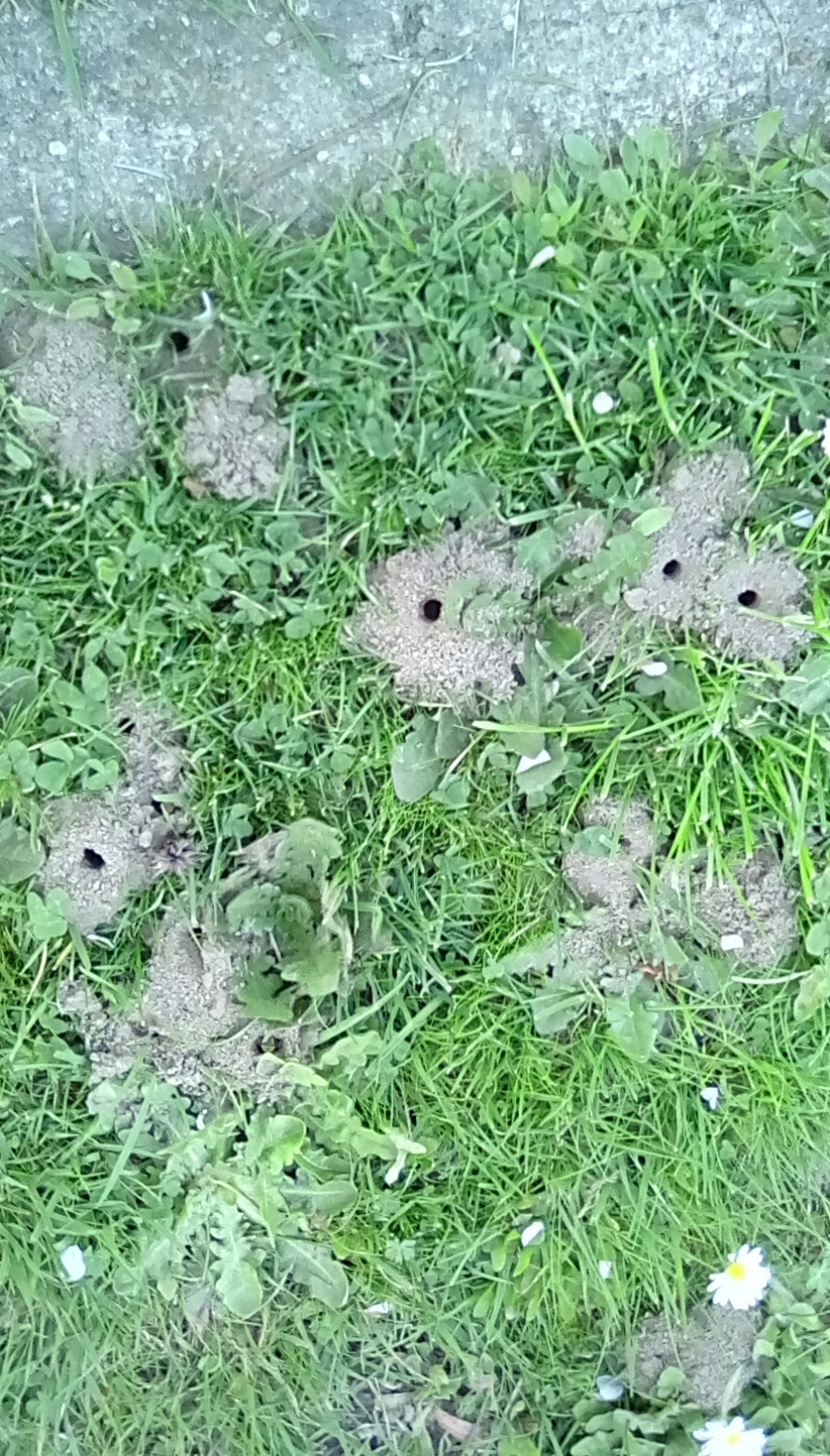emergent ground bees
22 views
Skip to first unread message
Michel
Apr 16, 2021, 3:38:21 PM4/16/21
to Mid-Valley Nature
 There are literally thousands of these little mounds at a local cemetery. Most are about 2-3 inches across and the hole is about a 1/4" in diameter. Unable to capture a photo of the insects, but there are many rather slow-moving small bee-like insects hovering (but not like a hover-fly) and flying slowly over the ground and as it warms, into shrubs and the air. Any thoughts on what these could be would be greatly appreciated. I would like to urge the cemetery not to use pesticides on this property and if they are native and valuable pollinators that could be harmed, that would strengthen my case. They don't seem aggressive or interested in humans.
There are literally thousands of these little mounds at a local cemetery. Most are about 2-3 inches across and the hole is about a 1/4" in diameter. Unable to capture a photo of the insects, but there are many rather slow-moving small bee-like insects hovering (but not like a hover-fly) and flying slowly over the ground and as it warms, into shrubs and the air. Any thoughts on what these could be would be greatly appreciated. I would like to urge the cemetery not to use pesticides on this property and if they are native and valuable pollinators that could be harmed, that would strengthen my case. They don't seem aggressive or interested in humans.Michel
Apr 16, 2021, 4:20:52 PM4/16/21
to Mid-Valley Nature
The cemetery has lots of "weeds" in the lawn, and herbicides have been considered; my concern is - would most lawn weed herbicides affect these what are likely solitary (Andrena sp.) native bees negatively?
Lisa Millbank
Apr 16, 2021, 7:12:52 PM4/16/21
to Michel, Mid-Valley Nature
Here's a fact sheet from UMass Amherst that details the impact of various pesticides on honey bees. There just hasn't been enough research done on the thousands of native bee species to say that what is safe for honey bees is always safe for native bees, but in most cases the effects are probably similar.
The site says, "Most fungicides, herbicides and miticides are relatively nontoxic to
honey bees and can generally be used around them without serious harm." I believe that is true because many classes of herbicides work by acting on biochemical processes that are unique to plants, making them less harmful to animals. I've spent a lot of time working around areas that have been sprayed with common herbicides (to restore native vegetation), and in some of these places, there appears to be a positive effect for some native ground-nesting solitary bees. Many of these bees need bare ground or short, sparse vegetation, so rampant weed growth that covers up the bare soil is a problem for their life cycle. The herbicides create areas of ideal nesting habitat. Having said that, people need to understand the risks to bees and other environmental effects before applying any herbicide.
Insecticides are definitely a far bigger risk for bees because many of them can kill bees or change their behavior at extremely low levels. That also applies to insecticides labeled as organic, with few exceptions. Before using any type of pesticide, organic or not, people should read the entire label and look up info from the National Pesticide Information Center. OSU and EPA have created this site, which provides science-based information about the environmental effects of almost any type of pesticide.
Lisa Millbank
--
You received this message because you are subscribed to the Google Groups "Mid-Valley Nature" group.
To unsubscribe from this group and stop receiving emails from it, send an email to mid-valley-nat...@googlegroups.com.
To view this discussion on the web visit https://groups.google.com/d/msgid/mid-valley-nature/f9c2512a-3f58-4507-b831-73fe14633b6an%40googlegroups.com.
nancy bee
Apr 17, 2021, 8:41:25 PM4/17/21
to Michel, Mid-Valley Nature
Nice find Michel, thanks for sharing. I think I’ll go check down in Willamette park where I’ve seen ground nesting bees before.
Nancy Bee
"A good traveler has no fixed plans, and is not intent on arriving." -Lao Tzu
On Apr 16, 2021, at 1:20 PM, Michel <mls...@msn.com> wrote:
The cemetery has lots of "weeds" in the lawn, and herbicides have been considered; my concern is - would most lawn weed herbicides affect these what are likely solitary (Andrena sp.) native bees negatively?
On Friday, April 16, 2021 at 12:38:21 PM UTC-7 Michel wrote:There are literally thousands of these little mounds at a local cemetery. Most are about 2-3 inches across and the hole is about a 1/4" in diameter. Unable to capture a photo of the insects, but there are many rather slow-moving small bee-like insects hovering (but not like a hover-fly) and flying slowly over the ground and as it warms, into shrubs and the air. Any thoughts on what these could be would be greatly appreciated. I would like to urge the cemetery not to use pesticides on this property and if they are native and valuable pollinators that could be harmed, that would strengthen my case. They don't seem aggressive or interested in humans.
--
Reply all
Reply to author
Forward
0 new messages
